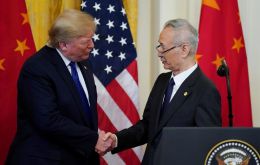MercoPress. South Atlantic News Agency
Tag: economy
-
Friday, January 31st 2020 - 08:25 UTC
Coronavirus and current account deficit hit the Brazilian Real against the dollar

Brazil’s currency the Real hit a two-month low against the dollar on Thursday, slumping to within sight of its record low under a wave of global risk aversion on fears over the coronavirus outbreak and its diminishing yield appeal.
-
Tuesday, January 28th 2020 - 08:16 UTC
Argentina's economy minister scheduled to meet IMF officials

Argentine Economy Minister Martin Guzman will meet with International Monetary Fund officials in New York on Tuesday, an IMF spokesman said on Monday, as the government continues talks with its biggest creditor ahead of a massive debt restructuring.
-
Saturday, January 25th 2020 - 09:15 UTC
Chile's business community anticipates an ailing economy during 2020

Chile's central bank is expected to hold its benchmark rate at 1.75% in January, a poll of 62 traders showed on Friday, then keep it there through 2020 as seeks to spur the ailing economy following months of unrest in the key mining nation.
-
Friday, January 24th 2020 - 08:45 UTC
Brazilian government finances rapidly improving; primary budget deficit could be eliminated by 2022

The Brazilian government's interest payment bill on the national debt could fall by 417 billion reais (some US$ $100 billion) over the course of its four-year term ending in 2022, by which time the primary budget deficit could also be completely eliminated, a senior Economy Ministry official said on Thursday.
-
Saturday, January 18th 2020 - 08:58 UTC
Support words from IMF chief for Argentina's efforts to recover the economy

International Monetary Fund Managing Director Kristalina Georgieva said on Friday the lender has had “very constructive” exchanges with Argentina's new Peronist government and would do whatever possible to assist the indebted country.
-
Friday, January 17th 2020 - 17:34 UTC
Chinese media warned not to “nitpick” the US/Beijing Phase 1 trade deal

Chinese state media on Thursday warned against any “nitpicking” as Beijing portrayed the Phase 1 trade deal with United States and its new commitments to massive purchases of US goods as a boon for China's economy.
-
Thursday, January 16th 2020 - 08:52 UTC
Argentine Inflation ended 2019 at 53.8%, the highest figure since 1991

Inflation in Argentina ended 2019 at 53.8%, the highest figure since 1991 when the peso was pegged to the US dollar, data institute Indec said on Wednesday. Indec said the cost of living increased by 3.7% in December alone.
-
Thursday, January 9th 2020 - 09:59 UTC
US district judge dismissed lawsuit against Argentina filed by hedge fund Aurelius

A U.S. district judge dismissed a lawsuit filed by New York-based hedge fund Aurelius Capital against Argentina, related to an alleged payment shortfall under securities offerings linked to the country’s gross domestic product.
-
Saturday, January 4th 2020 - 09:18 UTC
China pumps an extra US$ 115bn stimulus to the economy effective Monday

China moved to pump more cash into its financial system, suggesting that Beijing remained concerned about faltering growth despite signs that the world's second-largest economy was stabilizing.
-
Friday, January 3rd 2020 - 09:46 UTC
Brazil's 2019 trade surplus shrinks 20%, lowest since recession year 2015

Brazil’s trade surplus shrank 20% to US$ 46.67 billion last year, official data showed on Thursday, as upwardly revised exports in recent months failed to mask a widespread slump in overseas demand for Brazilian goods over the course of 2019.
